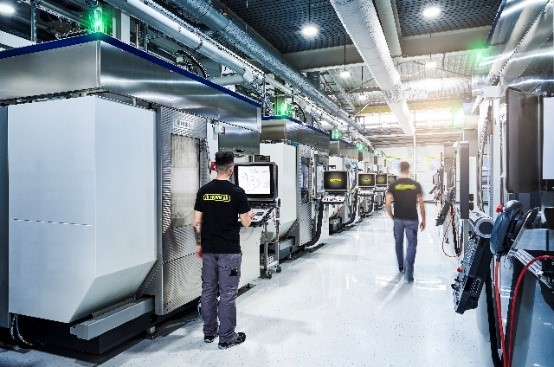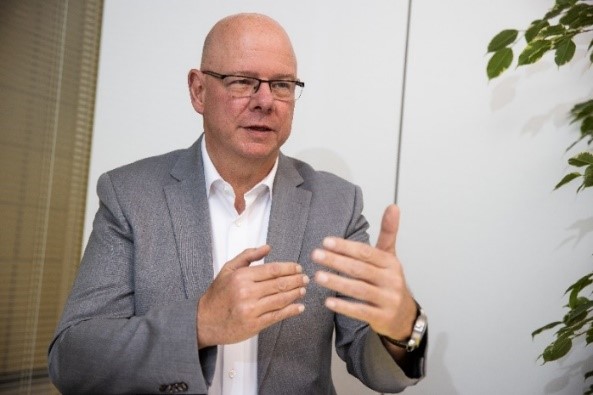
Sustainability is a central component of Paul Horn GmbH`s corporate philosophy. Quality assurance, environmental protection, energy efficiency, and safety have always been the focus of products and production.
On the product side, sustainability is particularly evident, for example with the replaceable head and replaceable insert systems. In the case of grooving tools, the range includes inserts with up to six cutting edges that can be used for longer before they need to be replaced.

Special and combination tools save process steps and thus also energy, while new substrates and coatings ensure longer tool life, which in turn saves material and energy. In the field of additive manufacturing, 3D-printed cooling attachments are used. Optimized structures ensure stability as well as material savings.
Quality management
As a manufacturer of precision tools, Horn has a responsibility to fulfill stringent customer requirements as well as meet the high demands internally concerning all services and products.
To meet these demands, HORN operates a modern quality management system. It includes market-oriented planning as well as the fulfillment of customer quality requirements using all economically justifiable means in accordance with DIN EN ISO 9001 and VDA 6.4.

"For us, sustainability is the most natural thing and is an integral part of our everyday life,“ said Markus Horn, managing director, Paul Horn GmbH. "You encounter this philosophy in all areas at our company.“
Horn said the production area is illuminated by energy-saving LED lights and the coolant is cleaned by filtration systems developed in-house. In this way, he said. the cutting fluid can remain in use for up to ten years. Photovoltaic systems are installed on the roofs of the two production buildings in Tübingen, Germany.
In both plants, the production areas are on two levels. The focus is on the economical use of the available space. Due to the heavy weight of the machines and equipment, it was not obvious that the use of two levels was feasible.
"Every company is part of society and, to secure its future needs not only turnover and profit but also the acceptance of the public and society. Irrespective of this, it has always been our attitude, especially as a family business, to live sustainability in all areas," said Horn.
Environmental protection is an important corporate goal and an indispensable part of corporate policy. The management system, which was validated in 1997 according to the EC Eco-Audit Regulation 1836/93, was adapted to the requirements of ISO 14001 in 1999 and has been certified since July 2000.
Energy management

Q&A with Andreas Loock, head of quality assurance at Paul Horn GmbH Sustainability has an important place in mechanical engineering – currently more than ever. What are your different perspectives on this topic? As an environmental and management officer at Paul Horn GmbH, my first focus is on compliance with legal regulations. In addition, securing a long-term cooperation with business partners and employees comes into play. Furthermore, local and regional value creation has priority over everything in this context. Sustainability also includes fairness and ethically correct behavior, the reduction or avoidance of environmental pollution and energy consumption, as well as the expansion of alternative energy generation, and the use of non-fossil energy sources. Q. Are there any legal frameworks that are relevant currently or in the future? Q. What role do certifications play? Q. What expectations do customers have? Q. What are the next steps at Horn? |
The energy management system applies to all facilities and activities. Those responsible continuously optimize procedures and develop measures to improve energy efficiency.
Sustainability also means ensuring that operations are as resource-efficient as possible, focusing on the expansion of renewable energy sources and the optimization of existing sources, as well as promoting on-site power generation.
For example, modern lighting systems, a combined heat and power unit, and photovoltaic systems are already in use and more are planned. All employees are regularly informed about the economical use of energy. The energy management system has been certified according to DIN EN ISO 50001 since 2013.
The human being in focus
The issue of sustainability must also be considered in the workforce. Long tenures with the company are a hallmark of HORN. It is important to take people with us, to provide them with further qualifications, and to prepare them for new challenges and technologies.
Within the framework of the HORN Academy, the qualification of employees can be adapted to the requirements within the industry. In addition, the promotion of independence and personal responsibility in the thoughts and actions of all trainees is another important factor in achieving the goals they have set themselves.
The HORN Academy is designated a "Träger nach dem Recht der Arbeitsförderung" (institution according to the law of employment promotion) in accordance with § 178 SGB III. The accredited certification company for the labor market and educational services, CERTQUA, has granted this approval. It is the basic prerequisite for the implementation of retraining measures offered by the HORN Academy.
Furthermore, the occupational health and safety of employees also represent an important factor from an economic point of view, which helps to improve the competitiveness of the company. HORN sees it as its task and challenge to question existing methodologies and to develop forward-looking solutions through continuous improvement of occupational health and safety. Issues related to products as well as processes merge here. The focus is on taking into account legal requirements for the occupational health and safety of employees.
Management system
The management system at Horn ensures that all organizational, commercial, and technical activities that have an impact on quality, the environment, energy efficiency, and employee safety are planned, controlled, and monitored. In addition, the management system ensures that contractually agreed requirements and the relevant regulations are met.
The system is based on the requirements of DIN EN ISO 9001, DIN EN ISO 14001, ISO 50001, and ISO 45001 in their current versions and applies to all phases of product creation. By taking into account the results of internal system audits and periodic reporting on quality, energy efficiency, environmental protection, and safety, the management assesses the management system's effectiveness.
Contact Details
Related Glossary Terms
- coolant
coolant
Fluid that reduces temperature buildup at the tool/workpiece interface during machining. Normally takes the form of a liquid such as soluble or chemical mixtures (semisynthetic, synthetic) but can be pressurized air or other gas. Because of water’s ability to absorb great quantities of heat, it is widely used as a coolant and vehicle for various cutting compounds, with the water-to-compound ratio varying with the machining task. See cutting fluid; semisynthetic cutting fluid; soluble-oil cutting fluid; synthetic cutting fluid.
- cutting fluid
cutting fluid
Liquid used to improve workpiece machinability, enhance tool life, flush out chips and machining debris, and cool the workpiece and tool. Three basic types are: straight oils; soluble oils, which emulsify in water; and synthetic fluids, which are water-based chemical solutions having no oil. See coolant; semisynthetic cutting fluid; soluble-oil cutting fluid; synthetic cutting fluid.
- grooving
grooving
Machining grooves and shallow channels. Example: grooving ball-bearing raceways. Typically performed by tools that are capable of light cuts at high feed rates. Imparts high-quality finish.
- quality assurance ( quality control)
quality assurance ( quality control)
Terms denoting a formal program for monitoring product quality. The denotations are the same, but QC typically connotes a more traditional postmachining inspection system, while QA implies a more comprehensive approach, with emphasis on “total quality,” broad quality principles, statistical process control and other statistical methods.
- recovery
recovery
Reduction or removal of workhardening effects, without motion of large-angle grain boundaries.

